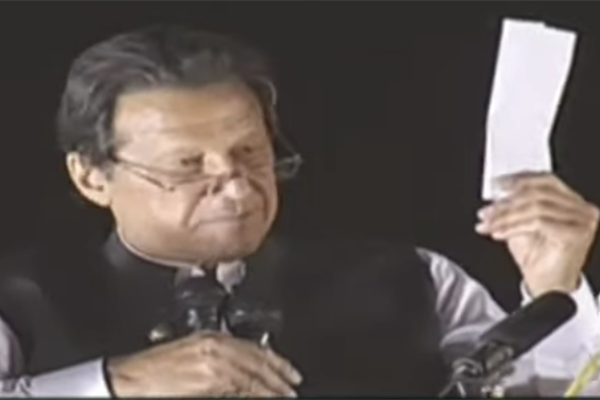
File photo
U.S. rejects as baseless any allegations of Washington’s involvement in the no-confidence motion against the prime minister
The Pakistan Tehreek-e-Insaf (PTI)-led government on Wednesday confirmed to a handpicked group of journalists that the “threat letter” first revealed by Prime Minister Imran Khan on Sunday had been authored by a Pakistani envoy on the basis of discussions with officials in their host country.
Addressing a rally in Islamabad on Sunday, the prime minister had alleged that the opposition’s no-confidence motion against him was part of a “foreign conspiracy” seeking his ouster for his “independent foreign policy.” Additionally, he had claimed that former prime minister Nawaz Sharif was working with foreign powers, and that funds from abroad were being utilized to oust Khan from office.
Khan did not provide any specifics during the rally, but pledged to reveal the letter’s contents to “senior journalists” and the federal cabinet on Wednesday after noting the prevailing view that he was trying to save his government by hiding behind unverified threats of “foreign conspiracy.” Earlier, the government had offered to share the letter with the chief justice of Pakistan, but did not receive any positive response on this.
During their interaction with the journalists on Wednesday, the PTI-led government summarized the contents of the letter but refused to share it, maintaining that it was protected under the Official Secrets Act, 1923. While they did not name any foreign government in the meeting, the government said the letter—or assessment—had been authored by a Pakistani envoy on the basis on discussions with a diplomatic official of their host country.
According to the summary shared with the journalists—they were not shown the actual letter—the foreign official had voiced his country’s displeasure with Prime Minister Khan’s foreign policy, especially his visit to Russia and “neutral” stance on the ongoing Ukrainian war. The Pakistani envoy was also allegedly informed that the future trajectory of ties between Pakistan and the host country was dependent on the fate of the no-confidence motion that the opposition parties were then planning to bring against the prime minister. Per the government, the envoy was warned of serious diplomatic consequences if Prime Minister Khan survived the no-trust vote.
The diplomatic assessment, per the government, was sent on March 7, a day before the opposition formally submitted the no-confidence motion and requisitioned a National Assembly session for voting on it. Contrary to the government’s claims of the assessment “predicting” the no-trust motion, the opposition had begun discussions to table it in Parliament in January 2022.
U.S. denies any threat
The U.S. State Department, responding to questions by Pakistani journalists, denied as baseless the allegations voiced by the government of Washington threatening the prime minister. Stressing that no U.S. government agency or official had sent any letter to Pakistan on the current political situation in the country, it said that Washington was monitoring the unraveling situation and supported the rule of law in the country.
Meanwhile, daily Dawn reported that the “threat letter” was actually a diplomatic cable sent by Pakistan’s then ambassador to the United States, Asad Majeed, on the basis of a meeting with Assistant Secretary of State for South and Central Asian Affairs Donald Lu.
On the face of it, there is little evidence to support the prime minister’s claims of the U.S. acting against his government. Bilateral engagements between the U.S. and Pakistan are continuing, while U.S. Under Secretary for Civilian Security, Democracy, and Human Rights Uzra Zeya was a guest at the OIC Council of Foreign Ministers meeting held in Islamabad last week.
However, the government maintains the letter is a “threat” and the prime minister has vowed to present it before Parliament in an in-camera session. It is unclear when this could occur.
